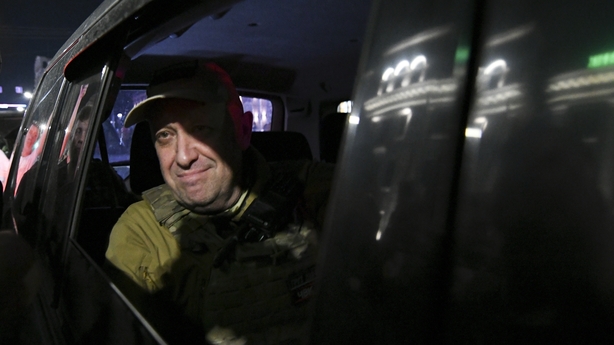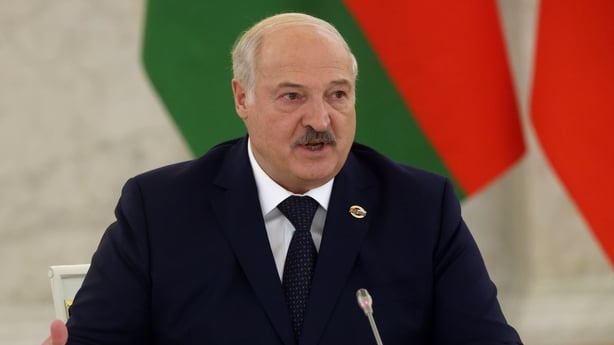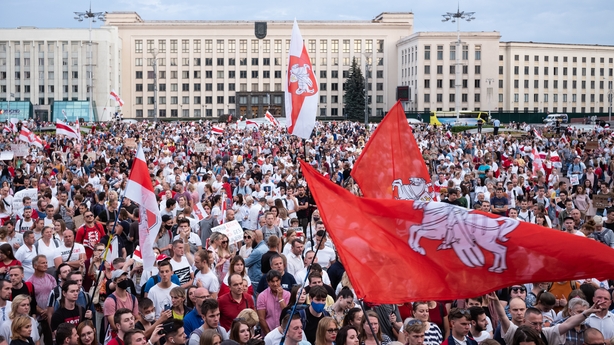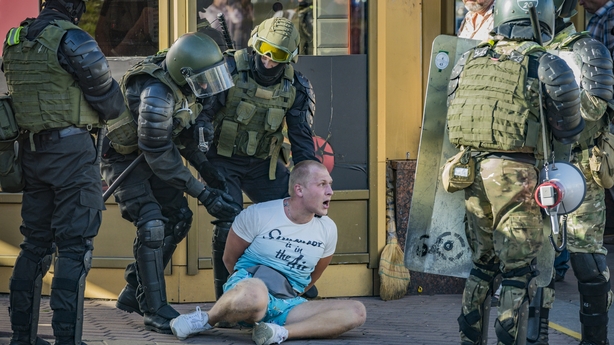Yevgeny Prigozhin, leader of the mercenary Wagner group, who led last weekend's one-day mutiny in Russia, landed in Belarus yesterday, according to the country's president, Alexander Lukashenko.
Mr Prigozhin's abortive coup was the biggest threat yet to Russian President Vladimir Putin's 23 years in power.
As Wagner units drove towards Moscow, Mr Putin looked to his junior ally, Mr Lukashenko, to mediate with the Wagner chief, and end the impending crisis.
Mr Lukashenko spent most of Saturday on the phone to Mr Prigozhin, brokering a deal, according to the Telegram channel of the Belarussian president.
And so, after instigating a mutiny, the caterer-turned-mercenary was offered safe passage to Belarus, and got off scot-free. It is not clear what concessions were made to Mr Prigozhin by the Kremlin.

But, why did the Belarusian president get involved?
"Lukashenko wants to survive. He understands that if Putin has a problem in Moscow, it will be a problem for him," Pavel Latushka, the deputy head of the Belarusian opposition-in-exile, told RTÉ News.
"His role in this process is arbitrary, because he has no possibilities to give guarantees to Prigozhin. He can only translate guarantees from Putin and the Kremlin," said Mr Latushka, a former Belarusian minister of culture, who now serves on the United Transitional Cabinet of Belarus.
For his role in opposition circles, in March, a court in Belarus sentenced Mr Latushka, in abstentia, to 18 years in prison for "conspiracy to seize power", among other charges.
Yesterday, Mr Lukashenko said that Belarus would accommodate Wagner fighters. Hosting the private army would pose a threat to Belarusian society, said Mr Latushka.

Mr Lukashenko has ruled Belarus since 1994. The former Soviet republic borders three NATO member states: Poland, Lithuania and Latvia.
But unlike Lithuania and Latvia, also former Soviet republics, Mr Lukashenko has kept his country closely tied to Russia, both economically and militarily, and increasingly so since August 2020.
That year, major pro-democracy protests erupted following a rigged presidential election, in which Mr Lukashenko claimed to have won 80% of votes.
Neither the European Union nor the United States recognised the result.
Losing his grip on power, Mr Lukashenko looked to the Kremlin to prop up his regime, and used his security forces to arrest thousands of protestors. Many were beaten by police in custody.
Senior opposition leaders left the country for Lithuania, including its main candidate, Svetlana Tikhanovskaya. Mr Latushka left for Poland.

Kamil Klysinski, a political scientist and expert on Belarus, told RTÉ News that Mr Lukashenko was more likely tasked by the Kremlin with hosting the Wagner boss.
"I don’t think it was Lukashenko’s initiative. He’s not a player anymore. He’s completely dependent on Russia’s support since 2020," said Mr Klysinski, senior fellow at the Centre for Eastern Studies in Warsaw.
"According to the press secretariat of Lukashenko, Putin called Lukashenko. He needed another loyal president from the post-Soviet space who could officially negotiate".
Since 2020, the Kremlin has looked for payback for helping Mr Lukashenko to stay in power.
In November 2021, Russia and Belarus signed a new doctrine on closer military cooperation, which established joint training centres, and the deployment of Russian military equipment in Belarus.
Three months later, Russia launched part of its invasion of Ukraine from southern Belarus, where it had built up more than 30,000 troops in advance of the attack.
Those closer ties with the Kremlin have been costly for Minsk.
From late 2020 onwards, the EU introduced sanctions against senior Belarusian officials, including Mr Lukashenko, and large Belarusian businesses, in response to the regime’s brutal repression of mass protests.

Heftier sanctions were introduced by the EU against Belarus in March 2022 for its role in aiding Russia’s invasion of Ukraine, targeting more than 700 individuals and barring imports of Belarusian iron, steel, oil, and potash, among other goods.
Since then, the EU has not, however, introduced another round of heavy sanctions against Minsk, despite the regime's close economic ties with Russia.
Mr Klysinski said that Mr Lukashenko had emerged from Saturday’s events with "some scores".
"Russian propaganda, since Saturday, uses this image of Lukashenko as mediator, peacebuilder and so on," said Mr Klysinski.
"This is needed to cover, in my opinion, the failure of Putin in this crisis. And it is mostly for internal usage in Russia and in Belarus, addressed to citizens," he said.
Mr Klysinski said he believed that Mr Prigozhin’s stay in Belarus would be short-lived.
"Only one male alpha can exist in Belarus, and that person is already Lukashenko. They will not cope with each other," he said.







